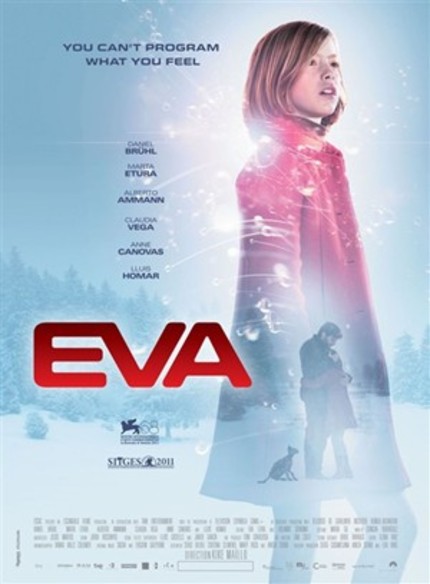Sitges 2011: EVA Review

I have to say I was specially excited to see this year's opening movie at Sitges. You can't find a lot of genre films in commercial Catalan cinema - at least not with production values and a budget as high as this - so I was certainly surprised when I learned about this one.
The year is 2041. After years of working abroad, Alex returns to his hometown upon an interesting job proposal. Being the robotics' genius that he is, he decides to take the ultimate challenge: To create a robot boy, capable of replicating the emotions of a human child as closely as possible. But there are other things waiting for him on his return as he has to confront Lana, his former lover who is now married to his brother.
To take on this daring project Alex needs a real-life child to use as a model but he doesn't want just an ordinary boy as he doesn't want just an ordinary robot as the result. And here is where enters Eva, the daughter of Lana and Alex's brother, who quickly fascinates Alex.
Moving away from depicting a highly technological future, debut director Kike Maillo chooses to create a world much more closer to our modern day. Eva's futuristic world is closer to vintage aesthetics, with very elegant and moderate visual effects, but very impressive nonetheless. The film takes place in an idyllic mountain town, perpetually blanketed in snow, and the camera manages to capture really spectacular landscapes. It certainly is a beautiful film to watch.
Alex is played by Daniel Brühl, a German-Catalan actor that ScreenAnarchy readers would probably remember from his role as the Nazi war hero Fredrick Zoller in Quentin Tarantino's Inglorious Basterds. But the real star of the show is the young Claudia Vega in the role of Eva, because she manages to come across as a charming and lovable girl where a lot of other girls would become just annoying. There's good chemistry between Brühl and Claudia, and the rest of the cast deliver solid performances throughout the film.
The film is not free of flaws, however. It draws ideas from many places - most obviously Spielberg's AI - and that's probably its greatest problem, as you can see the final twist coming from miles away. But none of the flaws is so big as to became fatal, so the result is a very enjoyable film.
I'm just hoping that Eva will help raise other genre projects in Catalan and Spanish cinema, as I'm sure there must be others with interesting ideas to tell, moving away from more typical Spanish films.
The year is 2041. After years of working abroad, Alex returns to his hometown upon an interesting job proposal. Being the robotics' genius that he is, he decides to take the ultimate challenge: To create a robot boy, capable of replicating the emotions of a human child as closely as possible. But there are other things waiting for him on his return as he has to confront Lana, his former lover who is now married to his brother.
To take on this daring project Alex needs a real-life child to use as a model but he doesn't want just an ordinary boy as he doesn't want just an ordinary robot as the result. And here is where enters Eva, the daughter of Lana and Alex's brother, who quickly fascinates Alex.
Moving away from depicting a highly technological future, debut director Kike Maillo chooses to create a world much more closer to our modern day. Eva's futuristic world is closer to vintage aesthetics, with very elegant and moderate visual effects, but very impressive nonetheless. The film takes place in an idyllic mountain town, perpetually blanketed in snow, and the camera manages to capture really spectacular landscapes. It certainly is a beautiful film to watch.
Alex is played by Daniel Brühl, a German-Catalan actor that ScreenAnarchy readers would probably remember from his role as the Nazi war hero Fredrick Zoller in Quentin Tarantino's Inglorious Basterds. But the real star of the show is the young Claudia Vega in the role of Eva, because she manages to come across as a charming and lovable girl where a lot of other girls would become just annoying. There's good chemistry between Brühl and Claudia, and the rest of the cast deliver solid performances throughout the film.
The film is not free of flaws, however. It draws ideas from many places - most obviously Spielberg's AI - and that's probably its greatest problem, as you can see the final twist coming from miles away. But none of the flaws is so big as to became fatal, so the result is a very enjoyable film.
I'm just hoping that Eva will help raise other genre projects in Catalan and Spanish cinema, as I'm sure there must be others with interesting ideas to tell, moving away from more typical Spanish films.

Do you feel this content is inappropriate or infringes upon your rights? Click here to report it, or see our DMCA policy.





